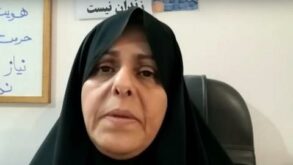CHRI – Political prisoners in Iran, long subjected to especially harsh treatment in Iran’s prisons, have been largely left out of the furloughs (temporary leaves from prison) typically granted to many prisoners for Nowruz, the Iranian new year that began on March 20, 2021.
With a handful of exceptions, the vast majority of those who went home for the new year holidays were not political prisoners.
In addition to being denied temporary releases, political prisoners have also been largely left out of the mass pardons that have been granted over the past year by the judiciary in response to the continuing threat from the COVID-19 virus.
As a result, political prisoners, typically convicted under manufactured national security charges, remain trapped in Iran’s overcrowded and unhygienic prisons and heavily exposed to COVID-19, which has run rampant in the country’s prisons.
In addition to rejecting a furlough request for the holidays, Iran’s judiciary also stalled an attempt by human rights attorney Saeid Dehghan to invoke a rarely-used article in the law in favor of his imprisoned client.
“Alireza Alinejad’s furlough request has been denied and as a result, for the second year in a row, Rayan and Baran [his children] will not be with their father on new year’s day,” Dehghan tweeted on March 18, 2021.
He added: “Meanwhile there has been no response to our request for a half-release in order to use my client’s expertise outside prison. It appears that humanity, in addition to the rule of law, has vanished.”
The attorney was referring to Article 57 of the Islamic Penal Code which states that the courts, with certain guarantees, can grant prisoners the ability to “pursue a vocational, professional, or educational activity… under the regime of half-release.”
Although the law has not excluded political prisoners or prisoners of conscience from this stipulation, judges have been reluctant to take this, or other legal avenues, into consideration to reduce COVID-19 infections.
Left Behind in Unhygienic Prisons, Political Prisoners Continue to Contract Covid-19
On March 17, 2021, the Iranian Human Rights Activists News Agency (HRANA) reported that at least 21 civil rights advocates had contracted the COVID-19 virus in Gharchak Prison for women in Varamin, south of Tehran, as confirmed by the prison clinic.
The infected prisoners include anti-compulsory hijab campaigner Saba Kord-Afshari, who was having severe breathing difficulties and significant pain.
Earlier on March 10th, imprisoned human rights lawyer Nastin Sotoudeh wrote to the State Prisons Organization calling for Gharchak’s closure because of unhealthy circumstances. “The unhygienic conditions, unclean water and bad weather cause the rapid spread of many diseases,” she wrote.
Arbitrary Judicial Decisions Target Political Prisoners
Meanwhile, despite pandemic conditions, labor activist Ali Nejati has been summoned to begin serving a five-year prison term on national security charges—a conviction for which he had been pardoned, but which the judiciary later said had been “by mistake,” according to his lawyer, Farzaneh Zilabi.
Nejati is a workers’ representative at the Haft Tappeh sugar plant in Shush, southwest Iran. He was arrested in November 2018 along with several other labor activists for their participation in a peaceful labor rally.
Article 96 of Iran’s Islamic Penal Code states, “Pardon or mitigation of punishment of convicts, in accordance with Islamic principles, is upon the proposal of the Head of Judiciary and approval of the Leader.”
Read this article in Persian
 Shabtabnews In this dark night, I have lost my way – Arise from a corner, oh you the star of guidance.
Shabtabnews In this dark night, I have lost my way – Arise from a corner, oh you the star of guidance.


